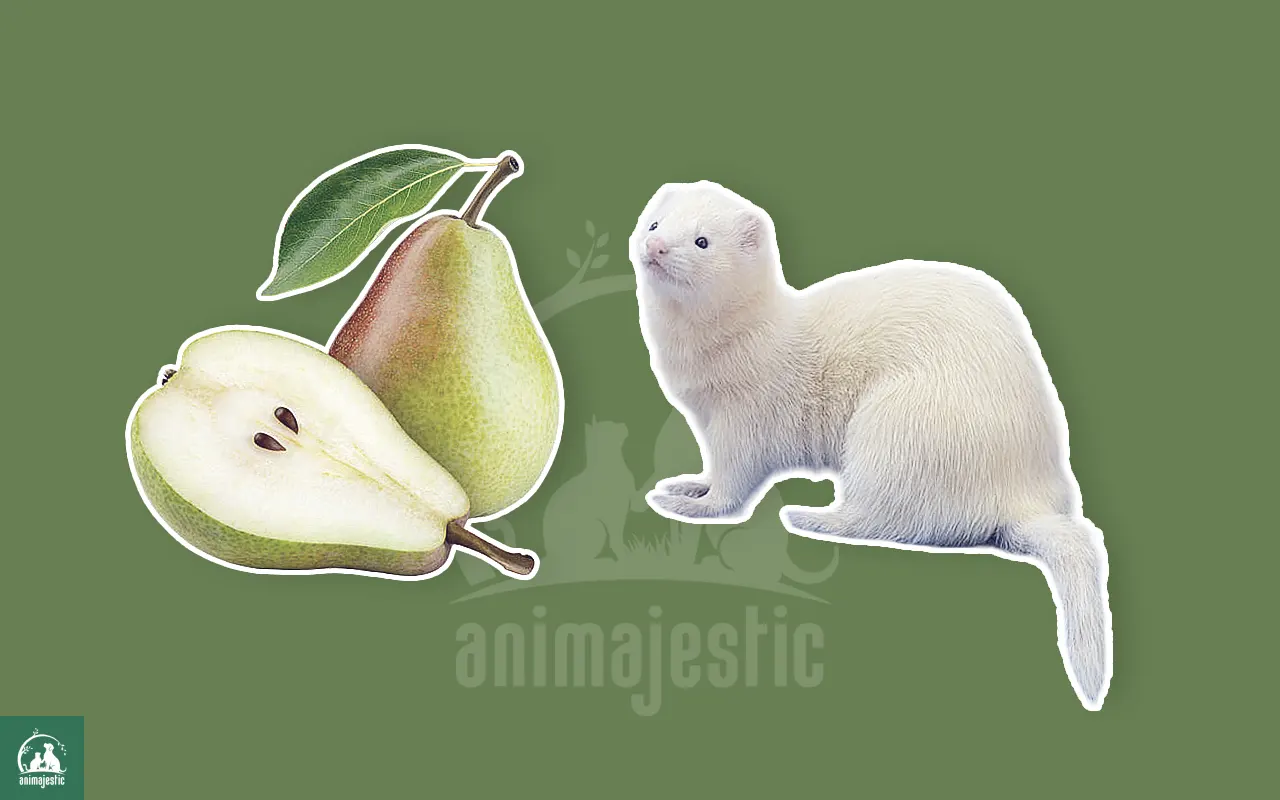As beloved pets known for their playful and curious nature, ferrets hold a special place in the hearts of many pet owners. Consequently, ensuring that we provide the best care and nutrition for our little furry companions is essential.
A frequent question asked about ferret diets is: Can ferrets eat pears? It is of utmost importance to address this question thoroughly, considering potential benefits, risks, and best practices when feeding pears to ferrets.
This article will help in making informed decisions on ferret diets.
Understanding Ferrets’ Dietary Needs
The first step in comprehending the role pears might play in a ferret’s diet is to recognize their unique nutritional needs.
Ferrets are naturally carnivores, which implies that their bodies are primarily adapted to consume and derive essential nutrients from meat. Wild ferrets typically hunt small mammals such as birds, mice, or rabbits for sustenance.
A carnivorous diet is high in animal protein and fat but low in carbohydrates. Simply put, ferrets thrive on a diet largely comprising meat or meat-based products.
Understanding the Nutritional Benefits of Pears
Before we go into the benefits and risks of feeding pears to ferrets, it is necessary to evaluate the nutritional content of these fruits. Pears contain essential vitamins, minerals, and dietary fiber valuable to humans.
Some of the notable constituents found in pears are:
- Vitamin C
- Vitamin K
- Potassium
- Dietary Fiber
While these nutrients contribute positively towards human health, their impact on carnivores like ferrets is not quite the same. Given the carnivorous nature of ferrets, their bodies cannot process plant-based nutrients as effectively.
Pros and Cons of Pears for Ferrets
In determining whether pears can be given as treats to ferrets, it is essential to assess the potential benefits and risks associated with pears in their diet.
Potential Benefits
There are no scientifically proven or direct benefits associated with feeding pears to ferrets. The nutrients mentioned above found in pears are either not required or obtained from animal-based sources in ferrets. Thus, pears don’t provide any significant nutritional advantages for ferrets.
Potential Risks
The most pressing concern surrounding pears in a ferret’s diet is the fruit’s high sugar content. Given ferrets’ short digestive tracts and their specialized systems aimed at digesting proteins and fats efficiently, they are not fully equipped to handle sugars and fibers in plant-based foods like fruits.
Feeding pears to ferrets can lead to a range of digestive issues such as diarrhea, bloating, or gastrointestinal discomfort. Prolonged consumption of sugar-laden fruits can also increase the risk of developing insulinoma, a condition caused by pancreatic tumors that affect insulin production.
Best Practices When Feeding Pears to Ferrets
Although it is evident that pears are not a necessary or ideal part of a ferret’s diet, some owners still choose to offer them as occasional treats. To minimize any potential risks, the following best practices can be followed when giving your ferret a taste of pears:
- Limit pear consumption: Do not make a habit of feeding pears to ferrets regularly. Instead, offer only a small piece as a treat once every few weeks.
- Always remove seeds and skin: Before allowing your ferret to sample a pear, remove the skin and seeds, as they pose choking hazards and may be difficult for the ferret to digest.
- Monitor for signs of distress: After giving your ferret a bite of pear, keep an eye out for any signs of digestive discomfort like diarrhea or bloating. If you observe any negative reactions, immediately discontinue feeding pears and consult a veterinarian.
The Final Verdict: Can Ferrets Eat Pears?
To sum up, although ferrets can consume pears in minimal amounts, these fruits are neither a necessary nor an ideal component of their diets. As carnivores, ferrets require a diet largely based on animal proteins and fats.
Pears and other sugary fruits do not offer significant nutritional benefits to ferrets and may pose health risks due to their high sugar content. If you do decide to treat your ferret to a small nibble of pear, remember to do so responsibly and monitor their reaction closely.
Ultimately, the best course of action for maintaining your ferret’s health and well-being is to provide them with a diet that closely resembles their natural food sources.
High-quality meat and meat-based products should form the basis of your ferret’s nutritional intake, ensuring they lead happy and healthy lives.
